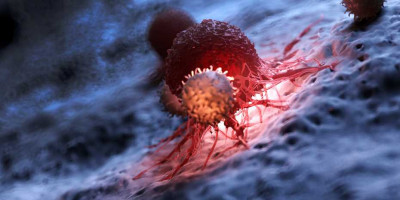
Cancer cells are masters at avoiding detection, but a new system developed by Yale scientists can make them stand out from the crowd and help the immune system spot and eliminate tumours that other forms of immunotherapies might miss, the researchers report in the journal Nature Immunology.
The new system reduced or eliminated melanoma and triple-negative breast and pancreatic tumours in mice, even those located far from the primary tumour source, the researchers report.
"This is an entirely new form of immunotherapy," said Sidi Chen, assistant professor of genetics and senior author of the study.
Immunotherapy has revolutionised the treatment of cancer but existing therapies don't work on all patients or not at all against some cancers.
Existing therapies sometimes fail to recognise all molecular disguises of cancer cells, rendering them less effective.
To address those shortcomings, Chen's lab developed a new system that weds viral gene therapy and CRISPR gene-editing technology.
Instead of finding and editing pieces of DNA and inserting new genes, the new system - called Multiplexed Activation of Endogenous Genes as Immunotherapy (MAEGI) -- launches a massive hunt of tens of thousands of cancer-related genes and then acts like a GPS to mark their location and amplify the signals.
MAEGI marks the tumour cells for immune destruction, which turns a cold tumour (lacking immune cells) into a hot tumour (with immune cells).
It is the molecular equivalent of dressing tumour cells in orange jump suits, allowing the immune system police to quickly find and eradicate the deadly cells, Chen said.
"And once those cells are identified, the immune system immediately recognises them if they show up in the future," Chen said.
The new system in theory should be effective against many cancer types, including those currently resistant to immunotherapy, he said.
Upcoming studies will optimise the system for simpler manufacturing and prepare for clinical trials in cancer patients.
Source: Yale University
The World Cancer Declaration recognises that to make major reductions in premature deaths, innovative education and training opportunities for healthcare workers in all disciplines of cancer control need to improve significantly.
ecancer plays a critical part in improving access to education for medical professionals.
Every day we help doctors, nurses, patients and their advocates to further their knowledge and improve the quality of care. Please make a donation to support our ongoing work.
Thank you for your support.